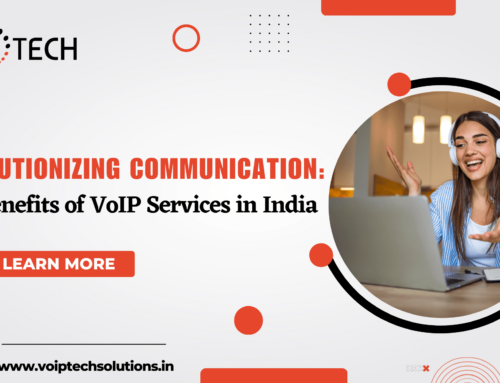VoIPTech solutions provide the best VoIP service provider in India also worldwide. Contact us today.
What is VoIP?
VoIP (Voice over Internet Protocol) is a telephone technology that allows you to make and receive calls via the internet instead of using traditional phone lines or regular phone lines.
Unlike traditional landline phone systems, which are restricted to a single desk phone in your office, VoIP allows you to make and receive business calls from your laptop, tablet, standard smartphone (through an App), and even VoIP compatible office phone sets.
It is incredibly cost-effective for both domestic and long-distance calls because all calls are made over the internet. Most corporate VoIP service providers provide unlimited minutes at no additional charge.
You get all of the advanced phone capabilities like call waiting, call routing, caller tones, auto-attendant, numerous phone numbers, and more, in addition to the cost savings.
This is why the vast majority of small and medium-sized businesses, as well as large corporations, are migrating from traditional phone carriers to the business VoIP service provider.
What do you mean by VoIP service provider?
The company or organization that provided the VoIP service is known as the VoIP service provider. Today Several companies are providing VoIP services also we provide the best facilities for you and your business. Before choosing any VoIP service provider first look at the facilities and benefits they are offered.
Here we discuss the 8 things you look for before choosing a VoIP service provider.
- Past Record Or Experience and knowledge
The longer a company has been in business, the better the service is likely to be. There will, of course, be exceptions. However, those who stick around are more likely to give high-quality services. Can you rely on a startup to not go bankrupt unexpectedly?
Another factor to consider is the provider’s knowledge of your sector. Some industries are heavily regulated and need strict adherence to regulations. Healthcare, education, and finance are just a few examples. Several providers specialize in meeting the needs of such companies. They may include features that are more targeted to your needs than a more generalist service.
- Support for Technical issues and Customer or user Service issues
Nobody thinks about customer service until something goes wrong. This is when you wish your seller was more responsive. You should be able to reach out to the service provider via email, chat, messaging, the website, and phone.
If you have an issue with the service, they should have knowledgeable customer service representatives who can help you. If the service is down, they should be able to provide you with an estimate of when it will be operational again.
Carefully read the Service Level Agreement (SLA). This contract spells out each party’s responsibilities. Your uptime/downtime assurances, scheduled maintenance windows, compensation for excess downtime, and other information can be found here. Is maintenance included in the promised uptime? Make certain you know every detail of this important paper.
- Security service
Even though security events make the news practically every day, it’s something many businesses overlook until it’s too late. Your VoIP service, like any modern technology, is exposed to various hazards. Like spam filters for email, VoIP requires its own set of tools.
The provider is responsible for one aspect of security. Any business-grade VoIP phone service, for example, should provide encryption. No one can steal or hack your information or data in this way. Inquire about the security features of your provider’s infrastructure.
You and your workers are responsible for the second half of security. To protect your phone system, the vendor can only do so much. Anyone can get into the system if employees write their passwords on Post-it notes. It’s time to start a security awareness campaign if you don’t currently have one!
- Total cost, with no additional cost
The total cost of a VoIP service is more than the advertised or sticker price. You may discover that the listed price excludes optional features, one-time charges, or additional expenses. Obtain a written breakdown of the various costs as well as the overall price from the seller. Your monthly bills should be fairly constant, with no unexpected costs.
When you upgrade to VoIP, you will incur additional charges in addition to what you pay the provider each month. Include these line items in your budget as well. Depending on your conditions, preparing your network for VoIP can be costly.
Is your current network hardware capable of handling voice traffic, for example? Do you have any routers or switches that need to be upgraded? Additionally, you should examine your Internet connection. Is it sufficient for VoIP? Many businesses are taken aback when a vendor or customer asks them a question and they don’t know the answer.
- Quality
It goes without saying, but it’s worth repeating. Call quality is the first thing to look for in any business-grade VoIP service.
Any VoIP service should provide you with high-quality audio. Previously, VoIP calls were choppy, and users might not have heard some words. Calls may be lost or disconnected unexpectedly. Those old days are no longer with us we are in the digital media era.
The best VoIP service providers today provide HD audio that is on par with, if not better than, traditional landline calls. Many people no longer know the difference between VoIP and analog calls. Make sure that the call quality is consistent. It is insufficient to have one good call out of ten. Every call that comes in or leaves the office should be crystal clear.
- Reliability
In general, VoIP phone services for small enterprises are more dependable than they were previously. That doesn’t mean you shouldn’t ask specific questions about each seller. Inquire about their emergency and catastrophe preparedness plans. What happens if your telephone line fails?
You should be able to automatically route calls to a landline or mobile number at the very least. Can your staff work from a different location? In the event of a natural or man-made disaster, how soon can you relocate and resume work?
Inquire about the VoIP provider’s data centers and infrastructure as well. Do they have a variety of backup options? What equipment do they have to keep your phones working? These are crucial questions to ask and receive responses to.
- Integrations with third-parties
Another factor to consider is how well a VoIP provider connects with your existing services. You could waste a lot of time migrating or re-creating business data that you already have in another product if you don’t integrate with third-party services. Make sure your VoIP provider integrates with your other services, whether it’s Salesforce, Google Workspace, Dropbox, or something else.
- Understand Your Needs
Some basic VoIP features include caller ID, call forwarding, and call waiting. However, additional advanced capabilities like auto-attendant, call screening, and call transcription may be included in your package.
Some features are included in your subscription for free, while others will be added as needed.
So, before you commit to a VoIP service, make a list of your requirements and desired features. You should not choose conferencing or music on hold simply because the service provider says it is “free.” Don’t get caught in the trap.
Determine your VoIP service requirements and proceed appropriately.
Why choose VoIPTech solutions?
To make the best decision, evaluate each provider against all of the criteria.
Finally, read testimonials from previous and present clients. Discuss phone service with various business owners and managers. Request recommendations from others. Many internet review sites compare various service providers, providing you with more options. Start making the switch today now that you know what to look for! VoIPTech solutions are the best VoIP service provider in India and also worldwide. We are very trustworthy and provide our service 24*7 hour. Contact us today.







